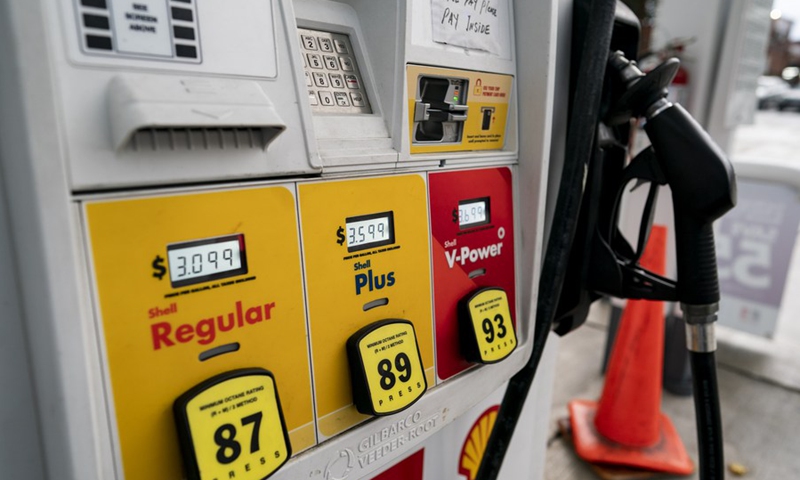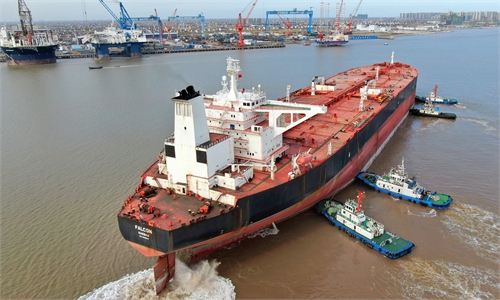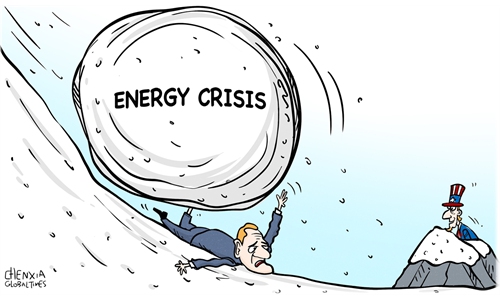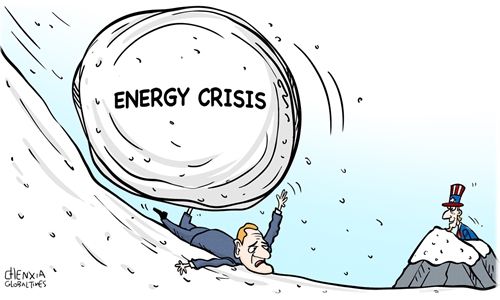Russia vows to respond to oil price cap, would bear ‘limited’ losses
Toughest measures only divide West, paralyze own market principles: experts

Photo taken on Aug. 11, 2021 shows a pump at a gas station in Arlington, Virginia, the United States.(Photo: Xinhua)
As Russia has warned on Monday to respond to a Western price cap on its crude oil - an initiative led by the US and endorsed by the Group of Seven and allies aimed at curbing Russia's income, Chinese experts pointed out that the price cap would bring losses for Russia but the extent will be relatively limited, as Russia has several backup plans.
Ultimately the price would still be paid by Europe, further widening the gap of its own divisions and paralyzing the market principles that the West has built itself on, they noted.
Russia, the world's second biggest producer of crude oil, said on Monday that a Western price cap on its oil would destabilize global energy markets but would not affect its ability to sustain its special military operation in Ukraine.
Kremlin spokesperson Dmitry Sergeyevich Peskov noted that it was "obvious and indisputable that the adoption of these decisions is a step toward destabilizing world energy markets," Reuters reported.
Europe and the US are poised to enforce two of the toughest measures targeting Russian oil exports. The first is a price cap joined by the US, Group of Seven countries, Australia, and the EU that sets a top price of $60 per barrel for Russian crude coming into effect on Monday, while the other is an embargo that prohibits EU countries from buying most Russian crude.
When asked whether China is considering joining the deal, Chinese Foreign Ministry spokesperson Mao Ning said at the routine press conference on Monday that energy cooperation between China and Russia is always conducted in the spirit of mutual respect and mutual benefit, and that ensuring global energy supply security is vitally important.
Concerns that the new price cap could disrupt global supplies in the coming months have already been mirrored in a jump in oil prices. Global benchmark Brent crude was up 1.95 percent at $87.24 a barrel by Monday, the Reuters report said.
"Moscow would feel a pinch as it would limit Russia's ability to export oil to the West, but it would not be a major impact," Cui Heng, an assistant research fellow from the Center for Russian Studies of East China Normal University, told the Global Times on Tuesday.
"It can find buyers such as China and India to fill in the gap, or, it can get round it by exporting oil first to Middle Eastern countries and then to Europe. Russia can also persuade more European countries to apply for exemptions for the new ban," the expert said.
Ultimately, the price will have to be paid by Europe itself, Cui noted, as they will have to find replacements for Russian crude and pay higher prices to buy LNG liquefied gas from the UK and US.
Setting a top price for crude oil is a serious violation of the market principles of the mature industry, and such an intervention will undermine the government's credibility and weigh on its troubled economy, Wang Yiwei, director of the Institute of International Affairs at the Renmin University of China, told the Global Times on Tuesday.
While some European countries worry that the price cap will "wreak havoc" for energy markets, their allies including the US, the UK and Norway are expected to reap benefits from the ban.
The difference of interests in this regard has created greater divergences within the Western system, observers noted, which goes the same for India.
India on Monday "stoutly defended" its imports of crude oil from Russia as Germany tried to pull it toward joining the deal, saying that Europe "can't make choices to prioritize its energy needs while asking New Delhi to do something else," asserting that its procurement was just one-sixth of total European purchases in the last nine months, NDTV reported.
The West does not take into account the development needs of India, but wants to force it to take sides out of "political correctness," Cui noted. It is natural for India to reject the requirement when no other compensation plans are offered to them in exchange.
As the anti-Russia measures come into effect, a separate decision by 23 major oil-producing countries known as OPEC+ agreed to stay the course on its output policy, sticking to reducing oil production by 2 million barrels per day, rather than considering fresh price-supporting production cuts, as some in the West had believed.
It showed that the voice of OPEC+ is growing on the international stage, and the organization is becoming more and more independent in its policy making, which is freer from pressures from the US than before, analysts said.



